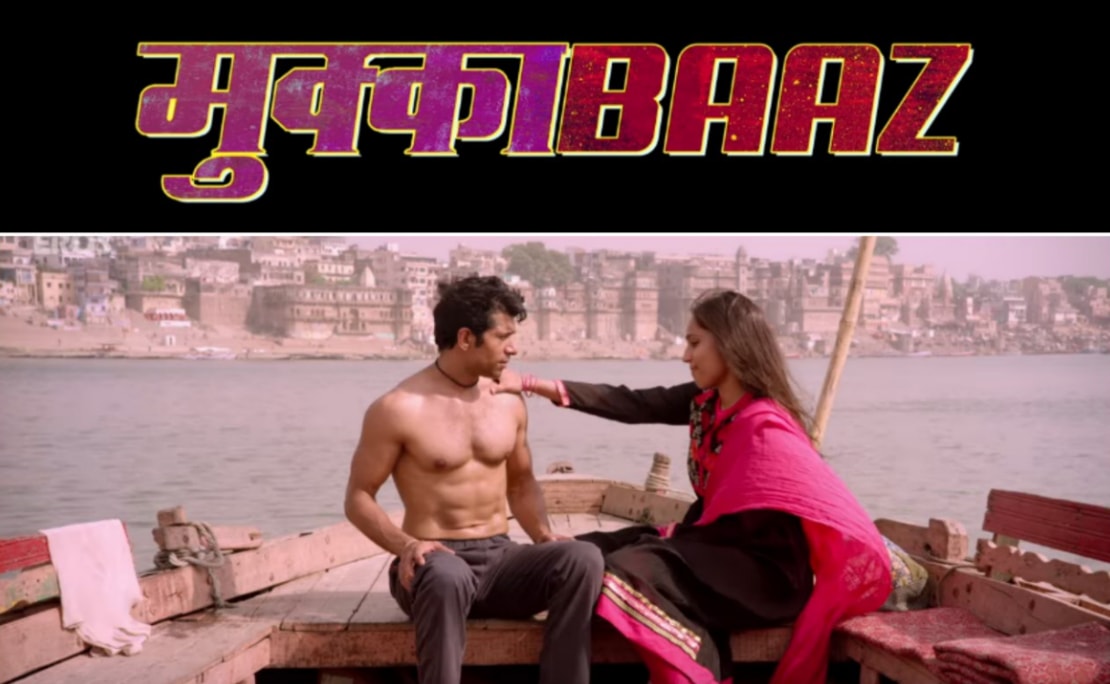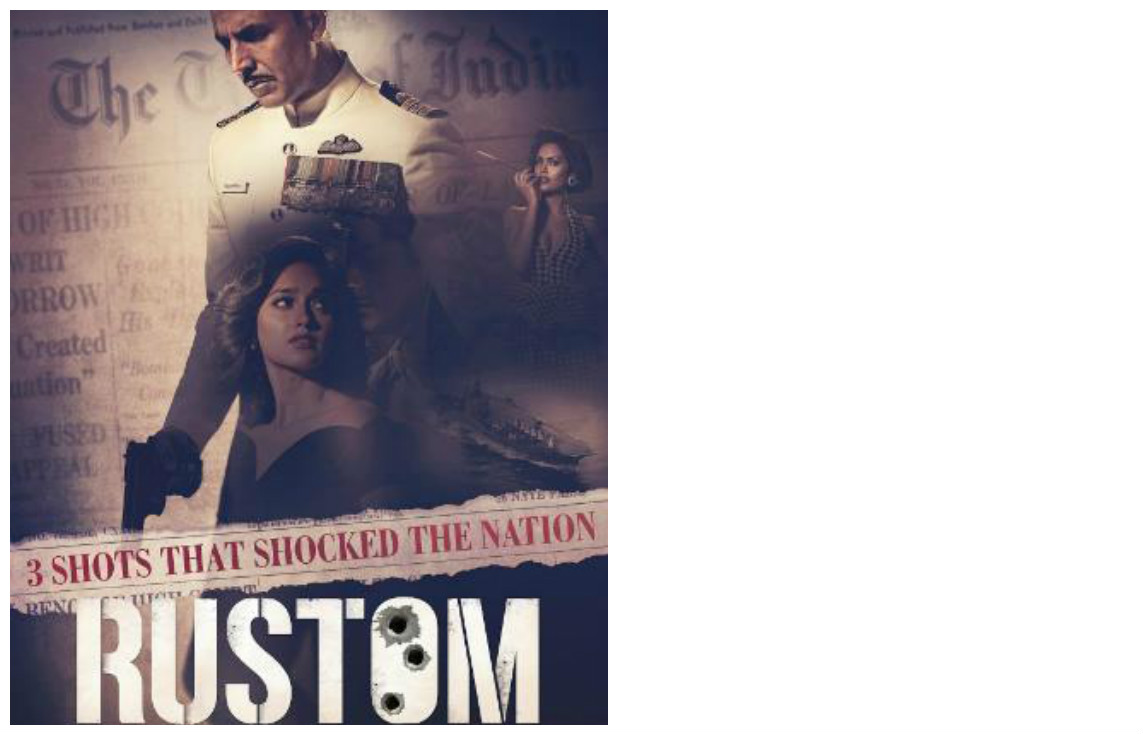Mukkabaaz
Mukkabaaz (The Boxer) : Movie Review
4.5 stars out of 5 ( Outstanding)
Director : Anurag Kashyap
Producers : Aanand L Rai, Madhu Mantena, Vikramaditya Motwane, Anurag Kashyap
2018, Hindi (English subtitles available)
Auteur Anurag Kashyap's "Mukkabaaz" could well have been titled "Bareilly's Biggest Multi-Tasker". Somewhat like but with far bigger challenges than the great Indian film heroes who have to not just act but also dance, sing and fight unlike their luckier Hollywood brethren who only have to do the first thing, The Boxer we see here doesn't just have to box at the top level but also accomplish the Herculean task of overcoming caste politics and wholesale skulduggery, do a day-time Railways job under the mercy of corrupt bosses who barely allow him to escape in the evenings for his boxing training, which again he has to curtail because home beckons but he is too tired to cuddle up to his wife whose hand he had to fight like a fiend to win. Forget a district-level medal, if any man or woman can wake up the next day to again go through the cycle of this insane circus, he or she deserves a million dollars in cash and a Lifetime Achievement Award.
'Mukkabaaz' was birthed through switching the babies in the creative cradle. Actor Vineet Kumar Singh, who had rendered superb thespian work for Kashyap multiple times before, came to the latter with a script along the lines of "Rocky" (1976). In India though, Rockies die a rocky death and Kashyap instead of erecting a mountain of fluff, told Vineet that they would make the film but jab it much closer to the bone, and that Vineet would have to train, blood risk guts and all, to become a real boxer. Vineet trained for a year, breaking his nose, his abdomen getting sculpted by rows of carved muscle and boxing close to how a pro would. The results show and and are shoved into the ring with bell-rings of reality. In real-life India, even state-level boxing tournaments are often deserted by the public, with useless politicians deciding who will represent the state and who will not. Talent is interred, chicanery is garlanded. But Kashyap's grinning sense of humour and flamboyance is on ripe display - a Kerala minister in real life mistakenly heaped praises on America's great boxer Muhammad Ali for being Kerala's own high-achieveing son - this gaffe is borrowed by the movie but Kashyap evolves it become a joke upon a joke.
What makes the film a caste apart from the standard-punch sports drama is therefore its fierce commitment to reality and realpolitik. Other films will have the audience cheering for the rising underdog ; this one does too but it also shows the boxing venue for a state-level competition being appropriated for a marriage function already underway while the newly arrived officials and boxers look on stunned. That's just the start of the dark circus. This film will "lose" in order to win the larger victory, but try selling these true-bones in commercial India.
Shravan Singh (Vineet Kumar Singh) is a top boxer in the town of Bareilly in Uttar Pradesh. This young man has enough talent and determination to make it to the national level but the local boss Bhagwan Das Mishra (Jimmy Shergill) will now allow this to happen. Mishra is an ex-boxer who belongs to the elite Brahmin caste, with political clout and riches to boot. He's also a vicious thug with a murderous streak, and hates Shravan largely because the latter does not care for him, with the other significant downer being that Shravan does not belong to a high caste. To make matters worse for Shravan, he is determined to woo the good-looking but mute Sunaina (Zoya Hussain) who is Mishra's niece. Both men will not back down come what may and so starts a dangerous war, made more even by heartening associates. Shravan would have been murdered quite early, but Mishra loves to see him live and suffer.
After Black Friday, Dev D , Gangs of Wassepur and Ugly, this is the fifth remarkable film that Kashyap has directed, in addition to the terrific short 'Murabba', bearing in mind that he was the writer for three great films - Kaun, Satya and Shool - before his directorial career. If he continues at this rate, he will eventually be at the same zenith of Indian cinema as Satyajit Ray and Ram Gopal Varma are.
Amongst Kashyap's various fortes has been the gift to construct bravura scenes of filmic story-telling. I lost count of the number of powerful scenes in 'Mukkabaaz'. Shravan's father taunts for him for dropping out of school and being unemployed, in return for which Shravan's backlash is a ferociously full-blooded tirade. A more aggressive father would rained slaps upon the son, but here Shravan's undeniable hook of reality makes the father silently sustain most of the blazing blows. It is the ethical heart of the film magnificently established early.
Another powerhouse sequence is when Mishra summons Shravan's new coach Sanjay Kumar (Ravi Kishan, in a superbly controlled act) for a dressing down. India's glorious caste system had decided that Sanjay Kumar is a lower-caste untouchable while Mishra is the heaven-born and this scene illustrates who actually is the man who should be treated like dirt. Verbal undercuts and retaliations are calmly expertly exchanged till the emotional temperature dangerously escalates, exquistely enhanced by the palpitating underline of Prashant Pillai's score.
Want that same dramatic power with lyricism and break-dance ? Kashyap rocks Benares's riverside stony Ghats with "Paintra" - a video song that is a virtuosic fusion of the coach's scriptural counsel, a teenager's striking break-dance and Shravan's formal training. Harsh mogrel music is elevated by striking beats and pulsing trumpets, and woven into the narrative like an urchin-Guru, the callisthenics oscillating between the aesthetic and the physical.
Mukkabaaz's music is a remixed reprise from the rural-cheeky brand pioneered by Kashyap's backing, harking to his "Gangs of Wasseypur". Rachita Arora is recruited this time to deploy the folksy-chic tunes and she does a good job, but Kashyap errs in allowing the singing to often become loud and overboiled while not guiding his composer to engineer truly enjoyable music. To be sure, he banks upon this overtly melodramatic device to make the film more saleable to his country's audience but the box office results have shown that the audience exclusively wants a star, a happy ending and will accept no other commercial whoring around. "Mushkil Hai" is the film's first song and its swinging rhythms and lashing beats are undoubtedly a success, as it shows Shravan dancing with the zest of a loon in a marriage celebration while a decked-up Sunaina's face brilliantly lights up on seeing her man in heat. But the other songs are uninspired, their strong local flavour lacking special melody.
Background score composer Prashant Pillai, as hinted earlier, delivers some dazzling results, being able to evoke radiant emotion with the economy of a sitar, while subtly pumping up other scenes with frisson-packed rhythms. But even he is shortchanged by the narrative's periodic insistence on overwrought "music". On a slightly different note, when Shravan lets loose a rain of punches late in the story, he chants "Jai Mata Di" which means 'Hail The Almighty Mother'. It comes off as terribly melodramatic, even though it is honestly meant to connote revenge taken for the entire motherland.
But what consistently redeems the film is the relentless focus on imaginative story-telling, and the running kicks with which it blasts apart casteism and corruption. Kashyap himself points out that his films have a significantly bigger scene count than other Hindi films, and Mukkabaaz ploughs through these thickets of highs and lows - Shravan's initial exile, his hidden training, an eventual big victory, another high in personal life, then the "plateaus" with his tight-rope walk on three tracks, then the crash and then again the resurgence - while making the songs part of the narrative rather than time-consuming extras. It is a world governed by bad men, but the script steadily discloses how good men still exist at various levels. The police inspector is a deceptively good example (Abhay Joshi in an act that that is as subtly effective as it is seemingly bland - cf. Tigmanshu Dhulia in 'Gangs of Wasseypur').
This may be a "boxing film" but some of the greatest friction and desperation comes from his tortured listless days at his railways job. Shravan rolls with the third-class punches until he is kick-upgraded to to the executive cabin where he has an electrifying show-down with his crooked superior. The boxing itself is perhaps the reason why not one, not two but four cinematographers cook the broth (some for the dramatic coverage, others for recording the boxing). There are no dishonestly quick cuts of scene to hide the action. As Vineet has trained well to be a real-boxer, he fights with intense confidence and the camera records this true grit with clean focus. The shot-taking remains from a point outside the ring, with no close-ups, but it does not compromise the power of the fight. Shravan wins most matches without great suffering, and we think the real killer fight is going to come in the semi-finals and finals, and so we wait....
The director's close associate, editor Aarti Bajaj, is on board here but her editing dazzle is not (the editing of the film trailer is fantastic, though). I noted a needless inclusion of some useless transition shots at a mid-way stage of the fim that reflected poorly on the editing, but then realized that the quality of splicing is actually decent for the amount of material covered, with the zenith being reached when Shravan hectically tries to balance working, boxing, and conjugal life. That shot quickly circles back to catch him on yet another day on his scooter at the traffic lights, gazing frustrated at the green signal to come on - the daily grind thus tellingly shown.
Vineet Kumar Singh acts better than Salman Khan and Akshay Kumar, and as well as Aamir Khan and Shah Rukh Khan. But as he prefers to steer away from audience-pleasing films, is not classically handsome and does not have a star father, his Indian commercial future is uncertain. Nevermind that his role does not have introspective shades here - he is given a wide selection of explosive scenes and he goes at them like scud missiles serially firing. The character of Bhagwan Das Mishra as the villain is deliberately low-key in demeanour and yet Jimmy Shergill makes him exude seething menace, taken to a coldly venomous acme in his scene with the coach where his blood-stained injured eyes are slickly filmed over by scarlet shades.
Zoya Hussain's film debut shows her in sprightly, endearing light. Kashyap's decision to make her character mute is a commercially dangerous one, which he felt would mirror "the lack of voice in the women of the region" (a point which will fall on deaf ears of most of his audience). This however makes Sunaina's romance with Shravan unique in Indian film history, what with the number of messages they exchange on their smartphones popping up separately on the screen in Hindi lettering - a bold choice as not many outside the Hindi-speaking Northern states can read Hindi fast enough, with no English subtitles provided either. One can hear Kashyap declaring - "But that's our national language, can't you read it ?!".
The film's sudden deceleration and cessation intially seems a shocking downer in what was to be a thrilling ascension but not for nothing has Kashyap cut his teeth on the great lacerating bricks of cinema verite. For him verity is paramount, more than money-making shibboleths are, and if you have to understand why a billion-strong country like India gives such profoundly shameless performance in sport, you have to appreciate why the finale ends the way it ends.
Top reviewer Bhardwaj Rangan rightly christened Mukkabaaz as "masala-fied" Kashyap. But a director like the latter, however much masala he throws in, ends up with a smackingly real-life flavour blend which Indian film audiences in general lack the taste to appreciate. Mukkabaaz seems to have grossed a total of Rs.10 crore (approx US $ 2 million ) while Aamir Khan's 'Dangal' (2016) , a film which takes off from wrestling, has grossed Rs. 2122 crore (that's not a typo). Kashyap may again tell naive outsiders that working with stars will makes his scripts "safe" and spineless but I find it heart-breaking that the country's best director should repeatedly fail at the box office like this. The reality is inescapable - it will still be some more decades before the majority Indian film audience shrug off their slavish devotion to star vehicles. I continue to be an advocate of the alternating formula where a gifted director should brilliantly manoeuver between making one film with a star and then making the next more liberated one without the interference of a star. This is admittedly easier said that done, but no other way way seems more feasible.
The film's last frame informs us (of interest to non-Indians mainly because Indians already know this and are preparing to make a run towards the next 'Dangal' while maintaining as far a distance as possible from this and the next 'Mukkabaaz') that in the 2016 Rio Olympics India earned a grand total of two medals. In the competitive world of cinema however, people like me can take heart that Anurag Kashyap should have been the winner of multiple international gold medals for a selection of his previous films though Venice, Berlin and Cannes did not have the caliber to honour him so. As for 'Mukkabaaz', it probably does not need a medal, because it is shrouded in so many golden wreaths.
UPNWORLD
UPNWORLD welcomes your comments










0 COMMENTS
WRITE COMMENT